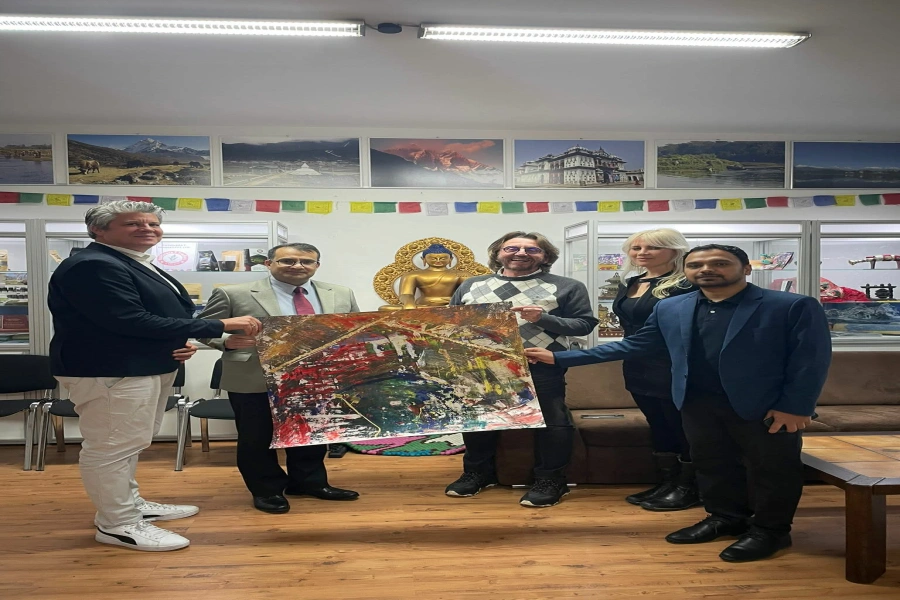KATHMANDU, June 19: The Socialist Front, which has been formed with the direct participation of the ruling CPN (Maoist Center), which is leading the incumbent government, seeks to build an alternative force at a time when the country’s political course is becoming unpredictable. Two major parties of the country came up with this concept to announce the alternative power alliance to keep the Nepali Congress and the CPN-UML under check and balance.
The Maoist Center led by Prime Minister Pushpa Kamal Dahal, Janata Samajbadi Party (JSP) led by Upendra Yadav, CPN (Unified Socialist) led by Madhav Kumar Nepal and Nepal Communist Party (NCP) led by Netra Bikram Chand have formed the Socialist Front in a show of solidarity and strength. The leaders issued a 15-point policy commitment by holding a joint declaration meeting in the capital on Monday.
After the Nepali Congress and the UML, the Socialist Front is going to be the third largest force in the federal parliament. It is said that these parties might merge in the future but for the time being they have decided to stand together under the banner of the Socialist Front albeit maintaining their individual party status.
They have also tried to define it as a third strand in politics.
Socialist Front leaders inspect vandalized Unified Socialist Pa...

"After the formation of the front, this new alliance now has 54 seats in the parliament and the front will move forward with common ideas," said Deputy General Secretary of the CPN (Unified Socialist) Jagannath Khatiwada, who is also the head of the Publicity Department of the breakaway faction of UML.
According to Kkhatiwada, the four-party front has become the third largest force in the parliament. These parties have joined forces to create a situation where no one can form a government without taking this power coalition in confidence.
In the House of Representatives, there are 32 MPs from the Maoist Center, 10 from the CPN (Unified Socialist) and 12 from the JSP. The number of MPs of the three parties has reached 54. The NCP led by Chand does not have any members in federal parliament.
In the House of Representatives, the largest party, Nepali Congress, has 89 MPs and the second largest party, the UML, has 78 MPs.
"By forming the third-largest alliance in the name of Socialist Front, the aim is to make it difficult for the Nepali Congress (NC) to form a government without the support of the Front, and make it difficult for the UML to form a new government under its leadership as well," said a leader who participated in the formation of the Socialist Front.
JSP leader Rajendra Shrestha said they decided to take the leadership on a rotational basis. “There is a 15-point plan and commitment to stay only at the center. However, the specific leadership arrangement on rotation basis has not been finalized yet,” he said.
Shrestha is also a drafter of policy commitments. While forming the front, the constituent parties also paid attention to the National Assembly. After the formation of the Front, it will be the biggest force in the National Assembly. From these three parties, there are 54 MPs in the House of Representatives and 25 MPs in the National Assembly, making the Socialist Front decisive in the formation of the government.
Sources said the Front has developed two alternatives to consider while looking at the Nepali Congress-led government. This front is expected to compel both the Nepali Congress and the CPN (Maoist Center) to think. The top leaders of these parties are reportedly pressuring that without this front, no one will be able to form a government under their leadership.
After the Nepali Congress and the UML, the Socialist Front has become the third strongest force in the parliament. By forming a third line in the name of Socialist Front, the aim is to prevent Nepali Congress from forming a government outside this force and also to prevent UML from forming a government.
If NC wants to form a government under its leadership, it will have to bring together Janamat Party, Nagarik Unmukti Party, Loktantrik Samajwadi Party (LSP), Rastriya Swatantra Party (RSP) and Rastriya Prajatantra Party (RPP). But since it will be difficult for NC to bring these forces together, the Maoist Center, CPN (Unified Socialist) and JSP decided to build an alternative force.
The parties shared their 15-point policy commitment. According to this commitment, they aim to protect and strengthen the Federal Democratic Republic while defining the unique features of Nepali socialism and establishing a path to achieve it. Their stated goal is to put an end to the long-lasting exploitation, oppression, inequality, and discrimination based on class, ethnicity, language, region, gender, and caste in Nepal.







































